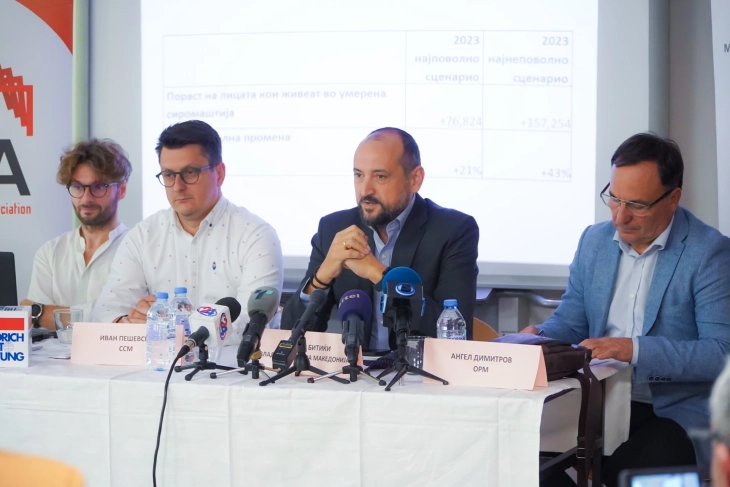Quarter of country’s population to drop below poverty line by end of 2023: economist
- By the end of 2023, North Macedonia would have 510.000 citizens living in moderate poverty. This includes all who have less than Mden 200 per day, which means that more than a quarter of the country’s population will only have funds for survival, said economic researcher Prof. Dr. Branimir Jovanovikj at a panel discussion Thursday titled “Decent Life or Survival?”.
- Post By Angel Dimoski
- 16:01, 12 October, 2023

Skopje, 12 October 2023 (MIA) – By the end of 2023, North Macedonia would have 510.000 citizens living in moderate poverty. This includes all who have less than Mden 200 per day, which means that more than a quarter of the country’s population will only have funds for survival, said economic researcher Prof. Dr. Branimir Jovanovikj at a panel discussion Thursday titled “Decent Life or Survival?”.
At the discussion hosted by the Macedonian Anti-Poverty Platform (MAPP) on the occasion of October 17 - International Day for the Eradication of Poverty, Jovanovikj presented the findings of a study assessing the impact of inflation on poverty in North Macedonia, drafted in cooperation with the Sustainable Inclusive Growth Association.
The analysis assesses two types of poverty – extreme and moderate. Extreme poverty applies to people living with less than Mden 60 per day, while moderate poverty applies to people living with less than Mden 200 per day.

“The results show that extreme poverty, as a result of the crisis, will rise by between 12.000 and 28.000 people, which is an increase of 20 and 50 percent compared to the previous situation, because before the crisis the country had around 56.000 people living in extreme poverty,” said Jovanovikj.
Jovanovikj stressed that the growth of moderate poverty is even larger – it is set to rise by between 80.000 and 160.000 people.
“Before the crisis this figure stood around 360.000 people, now, according to the latest data, it can reach up to 510.000,” said Jovanovikj.
He said the country should cap prices and keep them capped for a longer period of time, in order to prevent the growth of prices and rein in inflation, while at the same time increasing people’s incomes.
“This won’t reduce the figure. The number of people living in poverty will grow drastically, but this will at least mitigate it a bit,” said Jovanovikj.
The discussion was attended by the Vice-President of the council of the Federation of Trade Unions of Macedonia (SSM), Ivan Peshevski, who said that what has been evident for years, is that wages are statistically growing, however, poverty is also growing, thereby causing increasingly more citizens to experience a drop in their purchasing power.
“My appeal is that the money return to the workers if we want to eliminate poverty in the country, i.e., we aren’t requesting that the wages of officials are cut by 78 percent, but that the wages of workers are increased by that very same percentage,” said Peshevski.

The Deputy Prime Minister in charge of economic affairs, Fatmir Bytyqi, said the rest of world’s countries are facing poverty as well, and North Macedonia is no exception.
“Today it is clear that we would have had a much worse situation today if the Government hadn’t implemented the measures it did for the protection of the most vulnerable categories during the past three years of crises – post-Covid, energy, and economic crisis,” said Bytyqi.
The Deputy PM added that studies like the one presented at the event are good for the creation of evidence-based policies, the kind of policies which, he said, they will continue to create.
“I am constantly saying that systemic solutions are necessary for stability and predictable growth, but at the same time they also protect the most vulnerable, those whose rights are the first and easiest to violate during a crisis or political crises. We adopted such systemic solutions, such as the adoption of the minimum wage and the methodology for the calculation of pensions. This category of citizens, like never before since the country’s independence, is protected from such situations,” stressed Bytyqi.
The discussion was kicked off by the President of the Macedonian Anti-Poverty Platform (MAPP), Biljana Dukovska, who said “tackling poverty is a political decision, and each of us is important in that struggle.”
Photo: Government of North Macedonia







